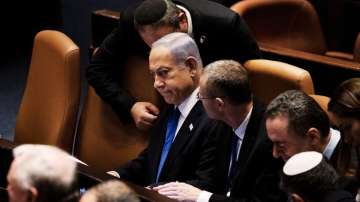Amid massive protests, Israel Parliament passes contentious law that curtails powers of Supreme Court
Multiple last-minute attempts within the Knesset to amend the bill or to come to a broader procedural compromise with the opposition failed.

Israeli Parliament on Monday approved a contentious law that prevents judicial checks on political power and forms a key part of Prime Minister Benjamin Netanyahu's plan to reshape the country's justice system, after weeks of unprecedented protests that have crippled the Jewish state. The bill passed with 64 votes in favour and zero against it, with the opposition boycotting the final vote on the bill in protest. It is the first major bill to pass in the government’s judicial overhaul.
Multiple last-minute attempts within the Knesset to amend the bill or to come to a broader procedural compromise with the opposition failed.
A series of ideas for unilaterally softening the legislation, discussed by Prime Minister Netanyahu and key coalition leaders even as the Knesset was preparing to vote, also led nowhere. The vote followed almost 30 hours of continuous floor debate that began on Sunday morning. During that period, hundreds of thousands of protesters took to the streets, both for and against curbing judicial checks on political power, The Times of Israel newspaper reported.
According to the law’s text, courts are prohibited from exercising any scrutiny over the “reasonableness” of cabinet and minister decisions, including appointments and the choice to not exercise vested authorities, it said.
The protesters have been demanding that the government shelve its contentious judicial overhaul initiative that will curtail the power of the courts to oversee the executive and legislative branch's decisions. The "reasonableness" bill would remove the power of the Supreme Court to overturn government decisions that it deems to have gone too far.
The controversial reforms have polarised Israel, triggering one of the most serious domestic crises in the country's history.
Over twenty-thousand protesters were demonstrating outside the Knesset
Prime Minister Netanyahu, 73, was discharged from the hospital on Monday after undergoing a successful procedure to implant a pacemaker, just ahead of a critical vote in the Knesset. Congratulating coalition party leaders, Justice Minister Yariv Levin after the final vote, said that it was the "first step" towards correcting the judicial system.
"In an extraordinary move, we took the first step in the historical process of correcting the judicial system and restoring the powers taken from the government and the Knesset over many years," Levin said.
Twenty-thousand protesters were demonstrating outside the Knesset chanting "democracy or rebellion" while the vote was being held inside.
Protest leaders vowed to continue their fight to protect Israel's liberal democracy. "The state of Israel will survive solely because of the millions (of protesters) who protected it with their bodies in the past months," they said.
"We will continue to struggle in order to preserve Israel's liberal democracy, and we will not stop until the threat is removed," they added.
Some 19 protesters were arrested in Jerusalem as police used water cannons on demonstrators at various places. Prime Minister Netanyahu, in his sixth term, heads an unprecedentedly hardline Israeli coalition government, which has sparked more than six months of internal opposition over its plans to overhaul the judiciary.
The legislation to block judicial scrutiny over the “reasonableness” of politicians’ decisions is the first overhaul bill to advance since Netanyahu temporarily froze the legislative blitz in late March.
Netanyahu, who is also in the midst of a protracted corruption trial, has been charged with three counts of fraud and breach of trust and one of bribery. He denies all the allegations and says he is the victim of a political witch hunt.
(With inputs from agency)